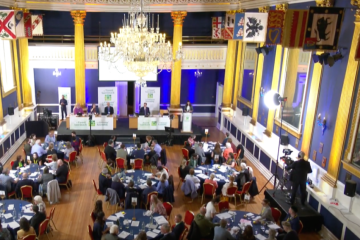Results-based farm funding to protect biodiversity is key

February 21st, 2019
Our outdated prescriptive and rule-based one size fits all agri-environmental payment system needs to be replaced by schemes focused on delivering results, a biodiversity conference has heard.
This week’s first-ever national biodiversity conference is examining ways in which Ireland’s agricultural sector – grassland makes up roughly 60 per cent of Ireland’s land mass – can work closely with nature.
Agri-environment schemes provide important sources of funding farmers to protect wildlife habitats on agricultural land. Results-based schemes focus on rewarding farmers for specific improvements in farmland biodiversity.
Since the early 2000s, a small number of farmers have been paid for ecosystem service through the likes of the Burren Life Programme and more recently through programmes to protect the endangered hen harrier and freshwater pearl mussel.
Speaking at the conference in Dublin Castle this morning, Shannon Parr of Burren Life outlined how the programme started off as a PhD project in the late 1990s for founder Dr Brendan Dunford to measure the impact of agriculture on the Burren’s natural heritage.
One of the key successes of the project, Ms Parr said, was that farmers were directly engaged from the get-go in the project. The team, she said, quickly realised that simply giving farmers some money to carry out conservation measures “didn’t always get the results wanted”.
“We needed to look at providing an incentive and this is where the results-bases ideas came into effect, essentially paying for results, making conservation a product just like the animals stocked on the land,” Ms Parr said.
Farmers are rewarded for protecting the Burren’s species-rich grazed habitat, alongside payments for actions to deliver environmental benefits decided by the farmers themselves.
The project has been key in changing the mind-sets of farmers in the Burren who are no longer “the scapegoats” for biodiversity decline. Instead, she said, they now revel in being actively involved in the protection of the environment in the region.
One of the most important results so far, Ms Parr said, was that Burren Life has been the “catalyst for other projects” in high nature value areas in Ireland and Europe.
She said that that it is encouraging to see that “our babies have flown” as the project’s principles are adopted by other programmes in the country.
https://www.youtube.com/watch?v=8vxeF3Y1ne8
Island biodiversity scheme
One such programme is Aran Life where eco-system services payments have been provided over the last five years to farmers on the three islands.
Dr Amanda Browne said that the islands are incredibly biodiverse with 500 plant species between them – 50 per cent of the total range of Irish flora. The islands are also important breeding grounds for several important bird species such as the lapwing.
While the island is biodiversity-rich, Dr Browne said that farming on the Aran Islands is “economically poor”, with many farms abandoned and overgrown in scrub. Water is also a very big challenge as there are no streams or rivers on the islands, she said, reducing grazing possibilities.
To counteract these issues, the programme provided one-off payments for scrub-cutting – “very hard manual work on the island’s rough rock terrain” – she said. In total, 92 hectares of fields and 28km of boreens were cleared, with €400,000 in payment to farmers for this work.
Clearing scrub is “only half the battle”, Dr Browne said, with payments going to farmers for keeping well managed and species-rich grasslands “optimally grazed” in priority habitats.
Between 2014 and 2016, Dr Browne said that there was an “incredible impact” in maintaining and conserving priority grasslands on the islands.
In addition, 131 new rain tanks were built and 107 repaired. Support for work on the island will continue under a new European Innovation Partnership (EIP) funding programme.

Photo: NMS Photo Unit
Custodians of the land
Speaking at the conference this morning, President Michael D Higgins praised the success of “innovative farmer-led programmes” such as the Burren and Aran projects where the important role of farmers as “custodians of the land” was acknowledged.
While this is welcome, participants in these programmes “sadly make up only a tiny minority of our farmers” he said and questioned if we are making the best use of the “significant level of public money” spent on agri-environmental schemes.
“Farmers and foresters must be clearly encouraged away from what we know are damaging practices and encouraged towards farming in harmony with nature,” he said.
Yesterday, Dr Micheal O’Briain of the European Commission said that Ireland is “taking a lead” in terms of result-based schemes such as the BRIDE scheme for dairy farmers in Co Cork and stressed the need to build on these pilot schemes going forward.
Andy Bleasdale of the National Parks and Wildlife Service said that the Burren Life Programme is a “beacon of hope” in Ireland, with more recent projects such as the curlew conservation programme also rewarding farmers for protecting endangered species.
Such results-based schemes need to be embedded into the next CAP to encourage farmers to provide the ecosystem services that the general public wants, he added.
[x_author title=”About the Author”]







